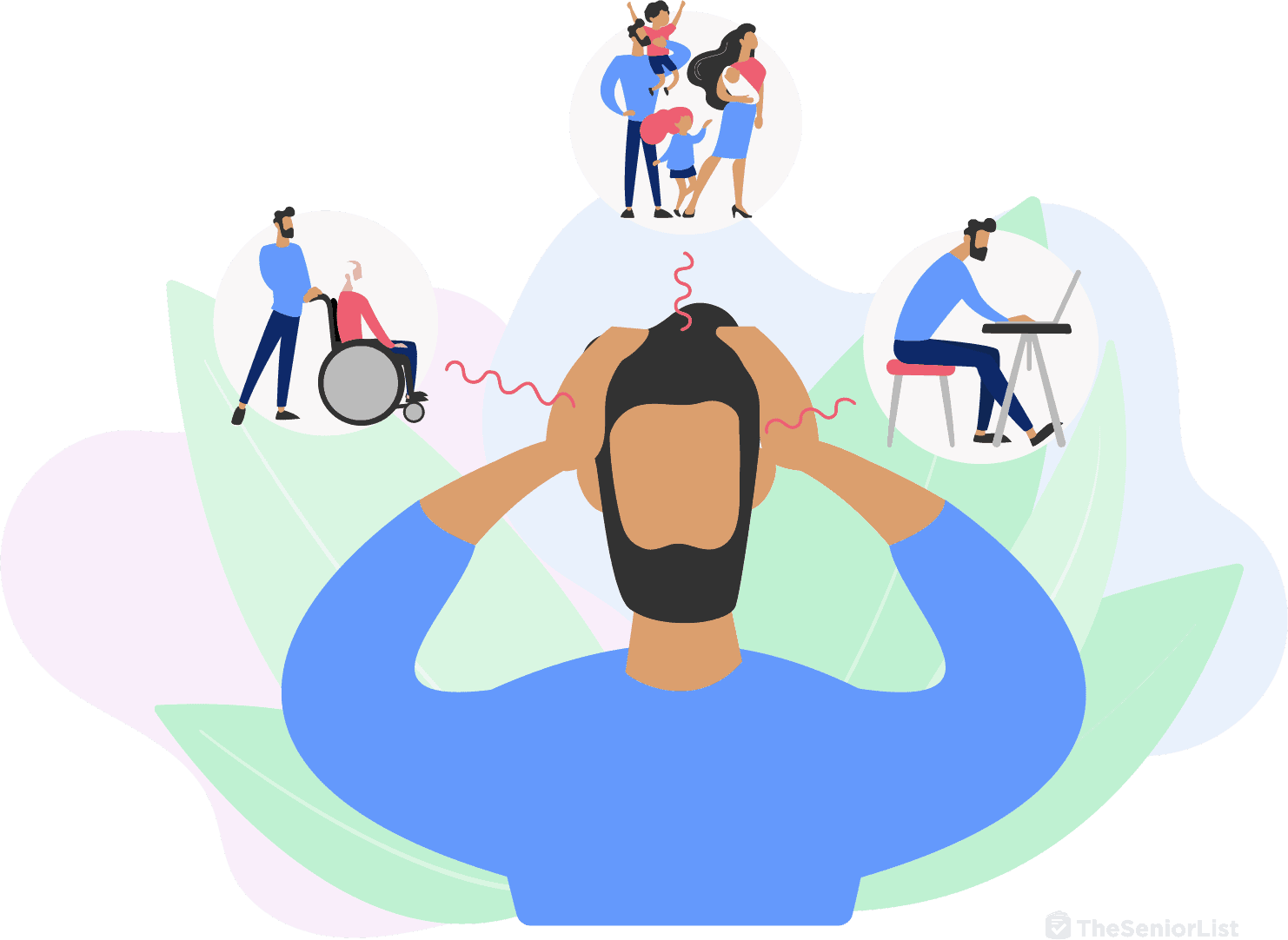Caregiver Burnout: Symptoms and How to Avoid Them
Caring for others can be deeply rewarding; however, the task comes with great responsibility. The demands of caregiving can limit social activities and prevent caregivers from maintaining their health and wellness. When this state of self-neglect reaches an intolerable level, you’ll experience what we call caregiver burnout.
For any caregiver, caregiver burnout is almost inevitable. To help mitigate its effects, you must recognize the impact of your burnout and the accompanying symptoms. Doing so will ultimately make you better able to continue providing adequate care for your loved one.
Pro Tip: New to the world of caregiving? Then read my guide, What Is a Caregiver, to learn my plethora of helpful tips and tools.
Caregiver Burnout Statistics
Caregivers are subject to varied stressors. Many of them work on an unpaid basis and have to juggle careers and other vital responsibilities with taking care of their loved one, creating emotional and financial strain. There may also be negative physical impacts if caregivers need to help patients in the bathroom or in and out of bed, compounded by the additional emotional stress of seeing a loved one in decline.

If you feel overwhelmed physically and mentally by your caregiving load, know that you are not alone:
- A two-year study of 181 healthy caregivers for patients with dementia found that 60 percent of participants developed depression or anxiety disorder within a 24-month period.
- The CDC states that 53 percent of caregivers report a decline in their overall health that negatively impacts their ability to provide care.
- 1 in 3 caregivers experienced financial difficulties related to their caregiving duties.
- 26 percent of caregivers face difficulties coordinating care for their loved ones — up from 19 percent in 2015.
- During the COVID-19 pandemic, stress intensified with 46.9 percent of caregivers experiencing anxiety, depression, and sleep problems.
FYI: With financial pressures being one of the most common ones facing caregivers, it’s important to stay on top of your finances. If you’re caring for a loved one, read my guide, How To Get Paid to Be a Caregiver for Your Parents to learn about state funding options.
Caregiver Burnout Quiz
To figure out if you’re suffering from caregiver burnout, ask yourself the following questions:
- Do you have trouble falling asleep and sleeping through the night?
- When caring for your loved one, do you find yourself feeling resentful or trapped?
- Do you find yourself losing your temper with others (especially the person in your care) more often than usual?
- Have you experienced a significant change in appetite?
- Do you have trouble engaging with friends and family members?
- Do the activities that once brought you relaxation and joy now leave you feeling listless?
- Do you feel pervasive anxiety when you leave your loved one alone?
- Are you feeling overwhelmed, like there is not enough time in the day to get everything done?
- Do you worry you are not doing enough to care for your loved one?
If the answer is yes to some or all of these questions, you may be experiencing caregiver burnout. Recognizing this is a good thing. It is the first step to getting better and finding new ways to prioritize your own health as you care for your loved one.
Caregiver Burnout Symptoms
Symptoms of caregiver burnout are similar to symptoms of anxiety and depressive disorders. These symptoms arise from mental and physical stress and can change your attitude from giving and sympathetic to irritated and unconcerned.
These are just a few symptoms of caregiver burnout:
- Energy loss
- Trouble sleeping
- Loss of fulfillment and satisfaction
- Increased irritability and anxiety
- Feelings of hopelessness and dread
- Inability to concentrate or focus
- Trouble relaxing or disengaging
- Pushing away friends and family
- Increased frustration with the person you are caring for
- Getting sick more often
- Bouts of crying or panic attacks
- Wanting to hurt yourself or your loved one
Tip: Help is available if you are thinking about self-harm. Please call the National Suicide Prevention Hotline at 800-273-8255.
Preventing Caregiver Burnout
While a bit of stress will undoubtedly come from caregiving, especially when caring for a family member, there are some steps you can take to stave off the worst symptoms of burnout.
Practice Mindfulness
Meditation can do wonders to reduce anxiety. Yoga and deep breathing techniques can help place you in the present moment and reduce stress levels. There are even apps on your smartphone with a daily guided meditation that can help center you during a chaotic day. Taking a few moments to pause, and find something positive about your day can be a good way to put yourself into a calmer, more peaceful frame of mind.
Seek Out Support and Appreciation
Those with dementia, Alzheimer’s disease, or a health issue that causes a great deal of physical pain or discomfort may not recognize the important work you do. And it’s not because you are not doing a good job, but because they are unable to. Remind yourself of the kind and grateful things they would say if they were in good health. You can also turn to a family member and loved one who can see the work you’re doing and remind you why it’s so important, selfless, and loving.
You don’t always need outside validation to feel acknowledged. I put post-it notes with kind words from mentors and loved ones in high-traffic areas like the fridge or bathroom mirror as a small pick-me-up. I also set reminders on my phone with positive affirmations and empowering quotes that help me get through tough days.
FYI: Conditions such as dementia pose particular risks with regard to caregiver burnout. To help mitigate these risks, read my guide: Caring for a Parent at Home with Dementia.
Know When to Take a Break
If you are feeling overwhelmed, ask a friend or a family member to run a required errand, put your loved one in adult day care for a few hours, or order takeout instead of cooking food. Take that time to do something you truly enjoy such as exercising, watching a movie, or getting a massage.

Another helpful tool is respite care, a temporary form of care that will provide you with a vacation of sorts. To learn more about this strategy, read my guide: What Is Respite Care?
If you can’t take a prolonged break, make sure to take small ones throughout the day. A 15-minute break can do wonders to rejuvenate and reinvigorate. Think of these breaks as necessary “brain food” to keep operating at a high level. Our brains can’t be in “caregiver mode” 24/7.
Tip: It’s easy to forget to take breaks. Use a day planner or a cell phone calendar app to schedule breaks into your day if you find yourself neglecting them.
Take Care of Your Own Health
It’s easy to neglect your own physical health when you are focusing so much on somebody else’s. Remember to exercise regularly, eat well, attend regular doctor appointments, and get enough sleep every night.
Studies have found that regular exercise can alleviate burnout and reduce stress. If there’s no time to go to the gym, take a short walk or a 10-minute online fitness class. Additionally, eating a well-balanced diet will do wonders in avoiding headaches, stress, and fatigue. One strategy I often employ is cooking well-balanced meals and eating with my client. Not only does this ensure that we both get our nutrients, but it also gives us some time for emotional bonding. Keep in mind that mealtimes can also be used as a time to decompress, sit in silence or enjoy some online time, too. Do not feel guilty for taking that time for yourself if that’s what you prefer.
Find a Caregiver Support Group
Other caregivers are the only group of people who know exactly what you’re going through. They can offer tips, advice, and positive reinforcement that can help you manage stress and take better care of your loved one. Meetings will help you get out of the house and remind you that you are not alone, and that there are many people in your area going through the same things you are.
Caregiver Burnout Frequently Asked Questions
-
What are three signs of caregiver stress?
Stress symptoms vary from person to person but there are a few indicators that can help you determine your stress level: feeling physically exhausted, overwhelmed, worried or tearful on a daily basis, and increased irritability.
-
How can I reduce my caregiver burnout?
Find time to take care of yourself. This can mean calling a loved one or friend to take over for a few hours while you take in a movie or go to the gym. It can also mean taking 10 minutes out of your day to clear your mind and meditate. Burnout can be avoided by identifying your own needs and finding the time to address them.
-
What is caregiver stress syndrome?
Caregiver stress syndrome is when someone neglects their own physical and emotional needs in order to take care of their loved one. It is difficult for somebody to take care of someone with a serious illness, especially while also working a full-time job, taking care of children, or managing a household. These competing responsibilities can lead to anxiety, depression, and loneliness.
-
Can you get PTSD from being a caregiver?
While there is currently no research that suggests caregiving causes Post Traumatic Stress Disorder (PTSD), psychologists are beginning to theorize there may be a link. Caregivers, especially those who care for severely impaired individuals, may be exposed to chronic stress which can manifest PTSD symptoms.
